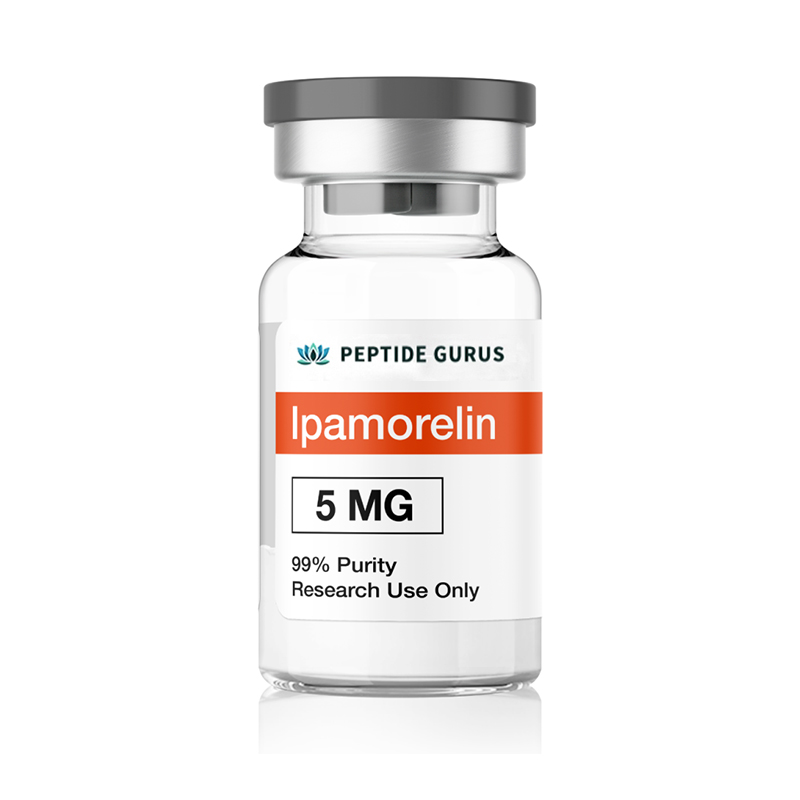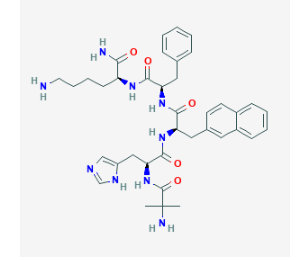



Categories: Peptide Finished product, Peptides and Their Dosages
Free (1) 30 ml Bacteriostatic Water
with qualified orders over $500 USD.
(excludes capsule products, cosmetic peptides, promo codes and shipping)
Ipamorelin is a pentapeptide, meaning that its structure is comprised of five amino acids. It is a GH secretagogue, and is considered to be an agonist, meaning that it possesses the ability to bind certain receptors of a cell and provokes a cellular response. Ipamorelin’s operational mechanics enables the peptide to stimulate the production of pituitary gland-based expression of secretions related to growth amongst animal test subjects. At the same time, the presence of the peptide has been shown to inhibit the production of a secretion known as somatostatin. Additionally, it has been determined that Ipamorelin has the ability to boost the production of IGF-1, or Insulin-like Growth Factor 1. Its presence plays a key role in the overall growth and repair of muscular and skeletal tissue.
Product Usage: This PRODUCT IS INTENDED AS A RESEARCH CHEMICAL ONLY. This designation allows the use of research chemicals strictly for in vitro testing and laboratory experimentation only. All product information available on this website is for educational purposes only. Bodily introduction of any kind into humans or animals is strictly forbidden by law. This product should only be handled by licensed, qualified professionals. This product is not a drug, food, or cosmetic and may not be misbranded, misused or mislabled as a drug, food or cosmetic.
Ipamorelin is a short peptide sequence capable of binding to the ghrelin/growth hormone secretagogue receptor. It is one of the most selective growth hormone (GH) secretagogues known and has been shown in laboratory studies to have no effect on ACTH, prolactin, follicle-stimulating hormone, luteinizing hormone, thyroid-stimulating hormone, or cortisol release [1]. Given its high level of specificity, ipamorelin has been of interest in research both as a therapeutic in and of itself as well as a model peptide for understanding how selectivity in receptor binding is achieved.

Peptide Sequence: Aib-His-D-2Nal-D-Phe-Lys
Molecular Formula: C38H49N9O5
Molecular Weight: 711.868 g/mol
PubChem CID: 9831659
CAS Number: 170851-70-4
Glucocorticoids, the class of corticosteroids commonly used to treat inflammation in conditions ranging from cancer to autoimmune disease, have a host of serious side effects that often limit their usefulness. Mitigating the side effects of glucocorticoids could provide for higher dosing of these medications and allow people to remain on them for longer periods of time, both of which could have positive benefits on morbidity and mortality. Ipamorelin has been shown, in several studies, to reduce or even reverse the side effects of glucocorticoid use.
One of the most profound problems associated with long-term glucocorticoid use is loss of bone density and subsequent risk of fracture. Current therapies include bisphosphonates, hormone therapies, and new monoclonal antibodies. All of these are effective treatments in their own rights, but they also all have side effects, limited efficacy, or high cost. Ipamorelin, on the other hand, is relatively inexpensive to produce and has a very limited number of side effects. Studies in rats indicate that ipamorelin can completely stop bone loss due to corticosteroids and even leads to a four-fold increase in bone formation in rats exposed to these drugs[2]. Further studies indicate that ipamorelin also increases bone mineral density systemically, thereby increasing the strength of both existing bone and newly formed bone[3]. As an added bonus, ipamorelin helps to offset some of the other side effects of steroids, such as muscle wasting and increased visceral fat deposition.
There is evidence to suggest that GH and growth hormone secretagogues like ipamorelin may reduce the catabolic effects that glucocorticoids have on muscle. Research in rats given glucocorticoids shows a decrease in nitrogen wasting in the liver and improved nitrogen balance following administration of ipamorelin[4]. Muscle wasting is one of the primary side effects associated with glucocorticoid use and a common treatment-limiting side effect. The ability to counteract muscle catabolism and bone-density loss with a single drug could be hugely beneficial to patients who require glucocorticoids.
Research in diabetic rats has revealed that ipamorelin can potentiate insulin release. This effect is most likely a result of indirect stimulation of the calcium channel found on pancreatic islet cells where insulin is made and stored[5]. Ipamorelin’s actions on the pancreas may help us better understand the functional limitations of type 2 diabetes and lead to the development of novel therapeutics or even preventative measures.
Post-operative ileus (POI) is a common condition that follows certain types of surgery, but is particularly common following abdominal surgery. The condition is characterized by an inability of individuals to take oral nutrition because the GI system ceases to function. It can be characterized by pain, but the primary problem with POI is that it slows discharge from the hospital and lengthens overall recovery time.
Ipamorelin has been investigated in several proof-of-concept clinical trials to determine if administration of the peptide can reduce POI. The research suggests that ipamorelin does shorten time to first meal by approximately 12 hours[6], [7]. Unfortunately, and despite early limited success, the trials were abandoned when the company conducting them decided that efficacy was not high enough to create a viable product. There is hope that ongoing research can boost efficacy or that research into combination therapies that include ipamorelin can find a synergistic effect with other compounds that will render the therapy more effective.

Ipamorelin is a selective ghrelin receptor agonist and binds strongly to the ghrelin receptor. The ghrelin receptor is known to increase in abundance in certain types of cancer (e.g. human carcinomas) and heart failure. Given these facts, researchers recently speculated that ipamorelin could be used as a probe in positron emission tomography (PET) as an aid to diagnosis. Basic in vitro studies have demonstrated the feasibility of this approach and have confirmed that ipamorelin[8], which is easy to synthesize in a lab, could theoretically be used as a PET probe. The next step is to test the probe to determine how well it functions in vivo and to develop standards for interpreting PET studies done with it.
Though ipamorelin does not have orphan-drug status at this time, it is still a neglected drug in research settings. Despite promising early studies, interest in ipamorelin has waned following the decision not to pursue it as a treatment for post-operative ileus. Ipamorelin has a number of benefits to offer, not just as a therapeutic, but as a tool for better understanding a number of disease states and their physiologic impacts. Ipamorelin will likely be of interest in research again, once someone jump-starts the field with new data and cutting-edge insight into the benefits of this unique peptide.
Ipamorelin exhibits moderate side effects, low oral and excellent subcutaneous bioavailability in mice. Per kg dosage in mice does not scale to humans. Ipamorelin for sale at
The above literature was researched, edited and organized by Dr. Logan, M.D. Dr. Logan holds a doctorate degree from Case Western Reserve University School of Medicine and a B.S. in molecular biology.

David E. Beck, MD is being referenced as one of the leading scientists involved in the research and development of Ipamorelin. In no way is this doctor/scientist endorsing or advocating the purchase, sale, or use of this product for any reason. There is no affiliation or relationship, implied or otherwise, between
ALL ARTICLES AND PRODUCT INFORMATION PROVIDED ON THIS WEBSITE ARE FOR INFORMATONAL AND EDUCATIONAL PURPOSES ONLY.
The products offered on this website are furnished for in-vitro studies only. In-vitro studies (Latin: in glass) are performed outside of the body. These products are not medicines or drugs and have not been approved by the FDA to prevent, treat or cure any medical condition, ailment or disease. Bodily introduction of any kind into humans or animals is strictly forbidden by law.
PeptideGurus is a leading supplier of American-made research peptides, offering top-quality products at competitive prices. With a focus on excellence and customer service, they ensure a secure and convenient ordering process with global shipping.
CONTACT